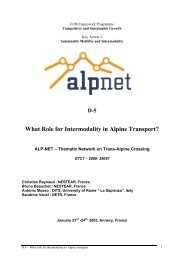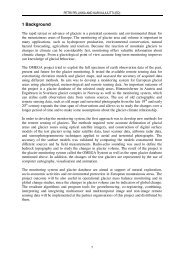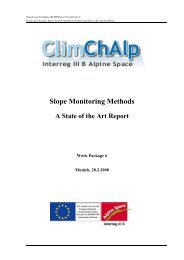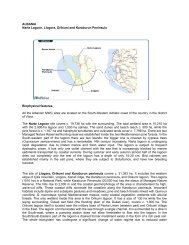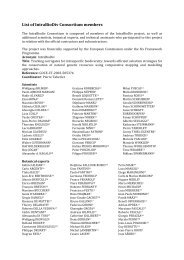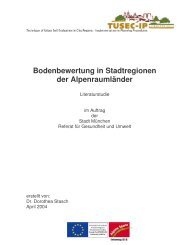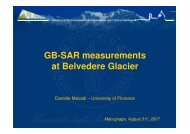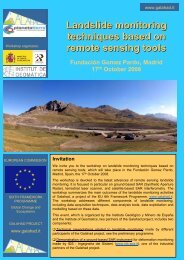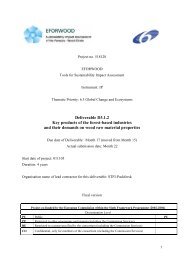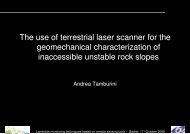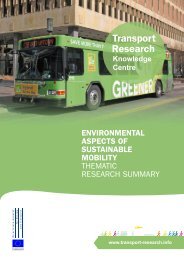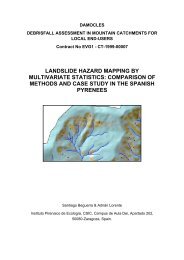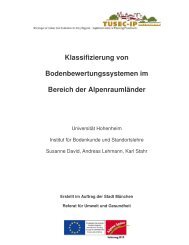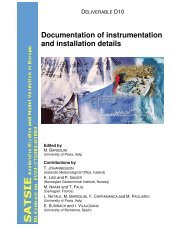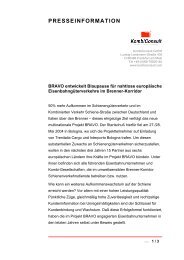Decision Support Tools - Thematic Research Summary - Transport ...
Decision Support Tools - Thematic Research Summary - Transport ...
Decision Support Tools - Thematic Research Summary - Transport ...
You also want an ePaper? Increase the reach of your titles
YUMPU automatically turns print PDFs into web optimized ePapers that Google loves.
simulations (Naples, Randstad, Paris, Stockholm and Hamburg), different scenarios havebeen defined characterised by medium and high adoption of e-economy (e.g. ICTcapabilities at competitive prices, smooth delivery of goods, payment security inteleshopping) and relocation of population (shift of citizens from/to urban, suburban, andother areas) (POET, 2005b).As for the simulation of freight transport, the impacts caused by e-economy on the level ofservice (improved transport times, reduced costs, improved reliability and flexibility, etc.)have been simulated. This simulation also considers the impacts caused by e-shoppingand the fact that e-economy developments applied to information systems influence theload factor by reducing the share of circulating empty or partially loaded vehicles (POET,2005b).The main results from the application of the model are that, in the High Adoption scenario,the development of e-economy will lead to a reduction of the passengers-km in all fivecities mentioned above, and larger reductions in passenger-km were seen where ICTwould lead to the relocation of population from outer zones to suburban and urban areasand from urban to suburban areas. The reduction of the passengers-km in the MediumAdoption Scenario is somewhat smaller but substantially similar to that of High Adoption.Concerning freight transport, the simulations have shown that the number of vehicle-km inthe studied cities (Hamburg and Naples) will increase in both the Medium Adoption andHigh Adoption scenario as a consequence of the development of e-economy. Thisincrease has been ascribed to the fact that the positive effects of the developments in e-economy on the efficiency of freight transport (increase in efficiency due to, for example,the optimisation of delivery trip planning) are less significant than the negative effects(decrease in the efficiency due to, for example, smaller inventories, and smaller and morefrequent deliveries, as well as widespread adoption of just-in-time management), (POET,2005a).The relatively cheap availability of petroleum has permitted a great expansion of thetransport system, mainly based on internal combustion engines. However, there is anincreasing concern about the environmental impacts caused by this fuel technology andthe future availability of resources of petroleum. Therefore, a wide range of new oralternative or improved fuel technologies are being developed, which will in turn causeimpacts and raise issues in case of their adoption and spread of use. In this respect,research has investigated a series of scenarios to make estimations of future conditions inthe energy, transport, economic and social fields to provide a basis for the development offuture policies and give insight into research requirements in the area of transport andenergy scenarios (STEPS, 2006). The scenarios have been mainly described by twovariables: fuel price, which is directly related to energy scarcity; and transport and energypolicies that authorities deploy in response to variation of fuel price. The scenarios were<strong>Thematic</strong> <strong>Research</strong> <strong>Summary</strong>: “<strong>Decision</strong> <strong>Support</strong> <strong>Tools</strong>” Page: 27 of 74<strong>Transport</strong> <strong>Research</strong> Knowledge Centre



